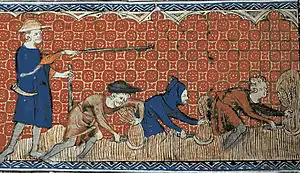Socage
Socage (/ˈsɒkɪdʒ/)[1] was one of the feudal duties and land tenure forms in the feudal system. Farmers held land in exchange for clearly defined, fixed payments made at specified intervals to feudal lords. The lord was therefore obligated to provide certain services, such as protection, to the farmer and other duties to the Crown. Payments usually took the form of cash, but occasionally could be made with goods.

Socage contrasted with other forms of tenure, including serjeanty, frankalmoin and knight-service.
The English statute Quia Emptores of Edward I (1290) established that socage tenure passed from one generation or nominee to the next would be subject to inquisitions post mortem, which would usually involve a feudal relief tax. This contrasts with the treatment of leases, which could be lifelong or readily subject to forfeiture and rent increase.
As feudalism declined, the prevalence of socage tenure increased until it became the normal form of tenure in the Kingdom of England. In 1660, the Statute of Tenures ended the practie of estates requiring owners to provide military or religious service, and most freehold tenures and other were converted into "free and common socage".
The holder of a soc or socage tenure was referred to as a socager (Anglo-Norman) or Socman (Anglo-Saxon, also spelt sochman, from the legal concept of a soke, from the verb 'to seek').[2] In German-speaking Europe, the broad equivalent was a Dienstmann. The etymology of socage according to William Blackstone is the old Latin word for a plough.
See also
References
- Wells, John C. (1990). Longman pronunciation dictionary. Harlow, England: Longman. p. 658. ISBN 0-582-05383-8. entry "socage"
- Partington, S W (1909), "2", The Danes in Lancashire and Yorkshire, retrieved 2012-05-15,
Tenants who owned such tenures were called 'sochmen', and the tenure itself was called 'socage'
External links
- Vinogradoff, Paul (1911). . Encyclopædia Britannica (11th ed.).
Soccage in Lower Canada: An act to explain and amend the laws relating to lands holden in free and common soccage in the province of Lower Canada
